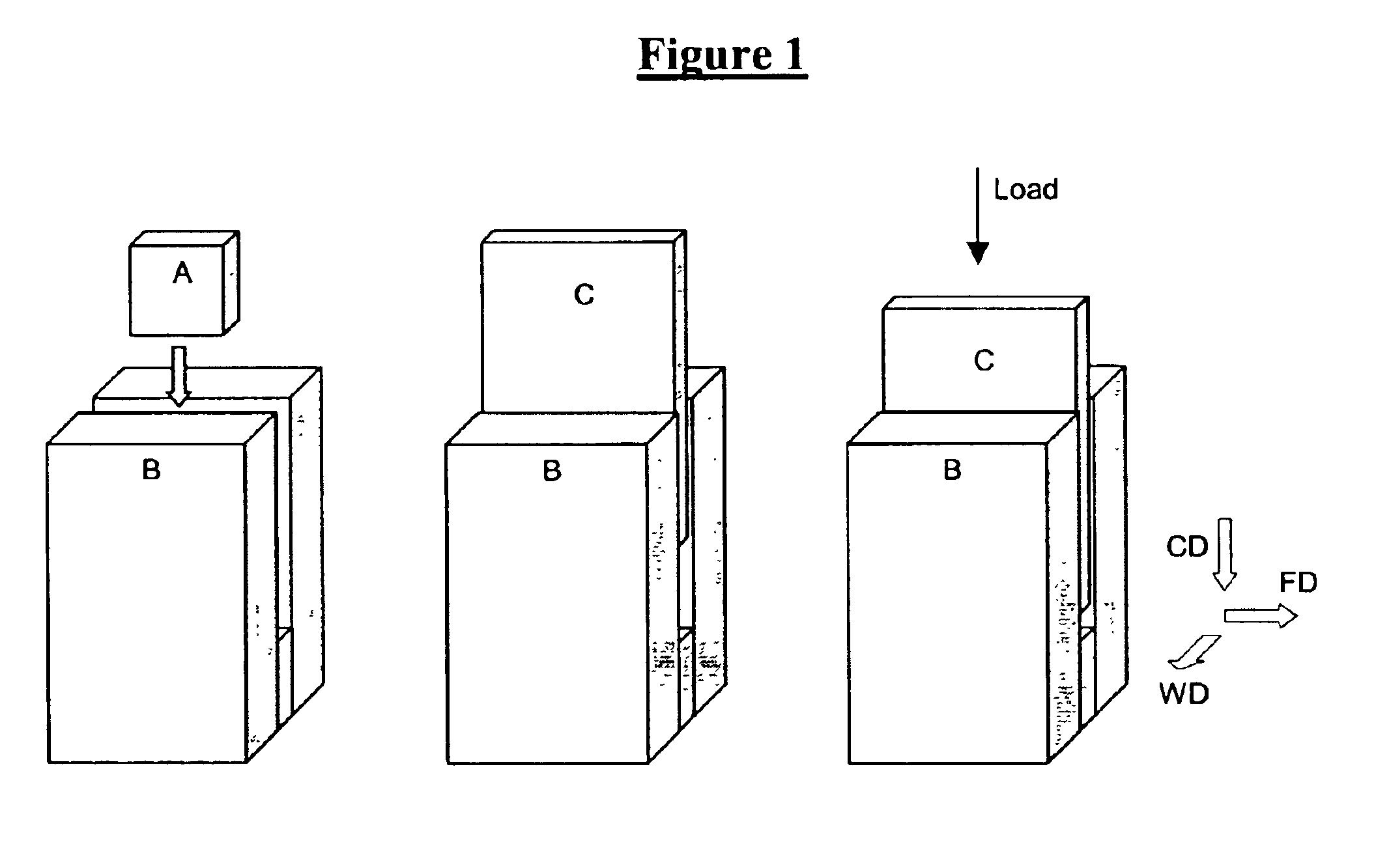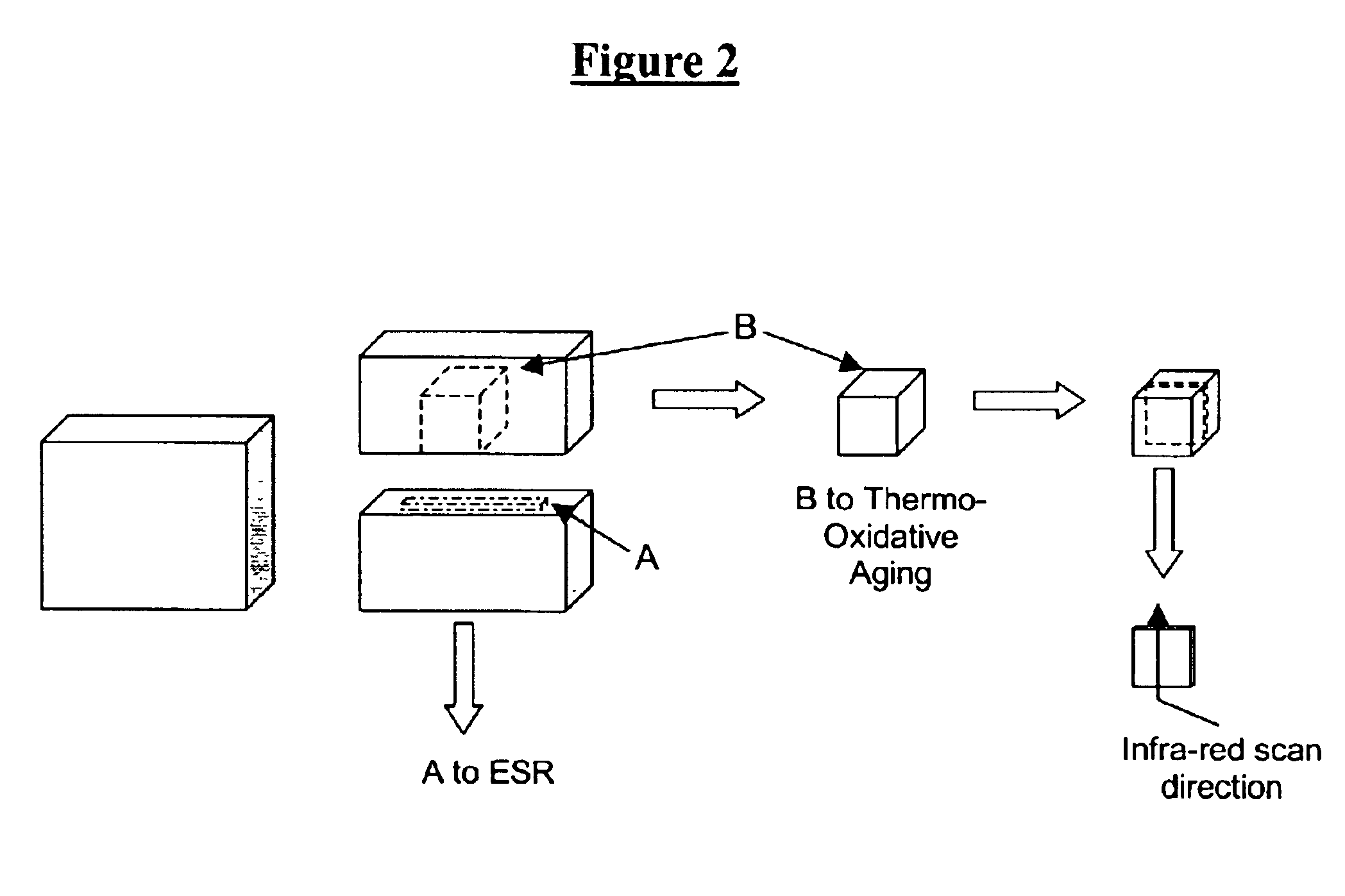High modulus crosslinked polyethylene with reduced residual free radical concentration prepared below the melt
a crosslinked polyethylene and free radical concentration technology, applied in the field of high modulus crosslinked polyethylene with reduced residual free radical concentration prepared below the melt, can solve the problems of reducing the final crystallinity of the material, adversely affecting the performance of in vivo devices, etc., and achieves the effects of high frequency sonication, and increasing the diffusion rate of sensitizing molecules
- Summary
- Abstract
- Description
- Claims
- Application Information
AI Technical Summary
Benefits of technology
Problems solved by technology
Method used
Image
Examples
example 1
Channel Die Set-Up in Sample Preparation
Referring to FIG. 1, a test sample ‘A’ is first heated to a desired temperature along with the channel die B. The channel die ‘B’ is then placed in a compression molder and the heated sample A is placed and centered in the channel. The plunger ‘C’, which also is preferably heated to the same temperature, is placed in the channel. The sample ‘A’ is then compressed by pressing the plunger ‘C’ to the desired compression ratio. The sample will have an elastic recovery after removal of load on the plunger. The compression ratio, λ (final height / initial height), of the test sample is measured after the channel die deformation following the elastic recovery. The flow direction (FD), wall direction (WD), and compression direction (CD) are as marked in FIG. 1.
example 2
Warm Irradiation with Sensitizing Gas Below the Alpha Transition
Test samples or a finished medical product of ultra-high molecular weight polyethylene (UHMWPE) are placed in a gas impermeable pouch (such as polyethylene laminated aluminum foil), purged with a sensitizing gas and sealed with sensitizing gas substantially filling the package. The package is then heated to a temperature between room temperature and 90° C. The package is then irradiated at the heated temperature using e-beam or gamma irradiation.
example 3
Warm Irradiation with Sensitizing Gas Below the Alpha Transition with Subsequent Annealing in Sensitizing Gas
Test samples or a finished medical product of UHMWPE are placed in a gas impermeable pouch (such as polyethylene laminated aluminum foil), purged with a sensitizing gas and sealed with sensitizing gas substantially filling the package. The package is then heated to a temperature between room temperature and 90° C. The package is then irradiated at the heated temperature using e-beam or gamma irradiation. The package is then annealed at a temperature that is below the melting point of polyethylene.
PUM
| Property | Measurement | Unit |
|---|---|---|
| deforming temperature | aaaaa | aaaaa |
| temperature | aaaaa | aaaaa |
| temperature | aaaaa | aaaaa |
Abstract
Description
Claims
Application Information
 Login to View More
Login to View More - R&D
- Intellectual Property
- Life Sciences
- Materials
- Tech Scout
- Unparalleled Data Quality
- Higher Quality Content
- 60% Fewer Hallucinations
Browse by: Latest US Patents, China's latest patents, Technical Efficacy Thesaurus, Application Domain, Technology Topic, Popular Technical Reports.
© 2025 PatSnap. All rights reserved.Legal|Privacy policy|Modern Slavery Act Transparency Statement|Sitemap|About US| Contact US: help@patsnap.com


